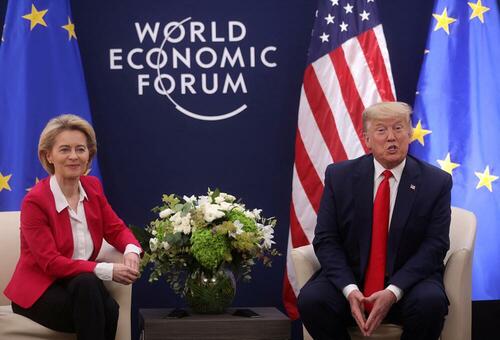EU Markets Not Immune From New World Disorder Of 'No Article V' Trump Office
By Teeuwe Mevissen, Senior Macro Strategist at Rabobank
This week shocked European leaders from Helsinki to Brussels and back via Berlin to Warsaw without skipping any of the other European NATO member capitals in Europe. What happened? During one of Trump’s campaign rallies Trump said that he would sort of encourage Russia to do whatever it wanted with NATO members that have not been meeting their defense spending fair share of 2% of GDP.
While this remark directly undermines NATO’s most crucial article V - which calls for military involvement of all NATO member countries if one of its members were to be attacked - it could hardly be real news for most of those ‘shocked’ European ‘leaders’.
Indeed it was nobody else but Trump who already told von der Leyen in 2020 that: "You need to understand that if Europe is under attack we will never come to help you and to support you," .
While it is no secret that Von der Leyen already failed miserably during her term as a minister of defence for Germany, she apparently failed again in taking Trump's words seriously back in 2020. While Trump’s recent NATO comments are everything but helping to advance America’s position on the global stage, Von der Leyen and many of her colleagues in Brussels and other mainly Western European leaders, failed to do what is necessary to prepare for a potential return of Trump or the return of his ideas embodied by someone else. They may now be coming around of that view, seeing Von der Leyen’s interview in the FT today, but precious time has been wasted.
Now imagine that Trump would win and would return to pro-fossil fuel policies that would make the US largely if not totally independent from any fossil fuels from abroad. He might pursue an isolationist approach here too, leaving the EU to scramble for much needed cheap energy from the Middle East.
Could the EU protect crucial sea lanes on its own?
That is doubtful, to say the least.
So what European leader could step up and take the lead in the much needed process to get Europe ready to engage effectively in a mass military build-up campaign fast should that turn out to be necessary?
That certainly does not seem to be Rutte as he has been responsible for the most dramatic cuts of the Dutch defence budget during his record long rein in the Netherlands.. Still he is the top favourite in securing the role of head of NATO. However, it must also be said that he has been on the forefront in supporting Ukraine and was one of the first Western leaders to provide Ukraine with fighter jets. Still it sometimes seems that for people who govern, failing to do your job properly is no barrier to continue to govern. And to be very clear, the very same goes for Trump. All of this seems to be indicating that international anarchy and global chaos resulting from it might be here to stay for the foreseeable future and markets will not be immune to this new world disorder.
One example of how for instance increasing rivalry between the West and China continues to plague companies that do business in China, was yesterday’s news regarding Germany’s automobile giant Volkswagen. Yesterday saw German luxury cars being impounded by the US after it became known that subcomponents in those cars were coming from the Xinjiang autonomous region and made by forced labour.
Or what to think of the fact that the large asset manager JP Morgan hires former chairman of the Joint Chiefs of Staff Mark Milley to advise the bank’s board of directors, senior leaders and clients on dangers around the world.
Does anybody need more proof that markets will not be immune to a new world in disorder?
Turning back to Europe, it remains to be seen what the impact will be of Europe seriously stepping up its efforts to rebuilt a defence industry but it is likely to be an increase of taxes and a decrease of the welfare system. On a 'positive' note: The European Council and Parliament reached a provisional agreement on new budget rules last Saturday that would give member states more budgetary leeway if they carry out reforms and invest in the green and digital transition, strengthening social resilience and, where necessary, defence.
One thing is sure, peace dividend will be something of the past and again certainly European financial markets will not be immune for a new world disorder.
Looking at what is happening today we saw UK retail sales coming in much higher than expected. Overall retail sales gained 0.7% y/y where a decline of -1.6% was expected. On a monthly base the rise was 3.4% vs an expected rise of 1.5%. However looking at those volumes the data shows the picture that measured in volumes, retail sales are still below pre pandemic levels. EUR/GBP therefore moves slightly up today mainly indicating a weaker pound with the current EUR/GBP exchange rate approaching the level of 0.86.
Next to that were the final inflation figures from France, which confirmed earlier estimates that prices declined 0.2% m/m but on a yearly base (3.4%) still exceed the ECB’s target level of approximately 2%. It must however be said that the data includes January discounts which are reflected by a sharp decline of prices for shoes and clothing (-9.2% m/m) although prices for transport also dropped with 4.8% m/m.



